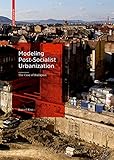Modeling Post-Socialist Urbanization : The Case of Budapest / Daniel Kiss.
Material type: TextPublisher: Basel : Birkhäuser, [2018]Copyright date: ©2019Description: 1 online resource (208 p.)Content type:
TextPublisher: Basel : Birkhäuser, [2018]Copyright date: ©2019Description: 1 online resource (208 p.)Content type: - 9783035616460
- 9783035616491
- 711.40943912 23
- HT384.H92 B835 2019
- NA9241.H82 B835 2019
- online - DeGruyter
| Item type | Current library | Call number | URL | Status | Notes | Barcode | |
|---|---|---|---|---|---|---|---|
 eBook
eBook
|
Biblioteca "Angelicum" Pont. Univ. S.Tommaso d'Aquino Nuvola online | online - DeGruyter (Browse shelf(Opens below)) | Online access | Not for loan (Accesso limitato) | Accesso per gli utenti autorizzati / Access for authorized users | (dgr)9783035616491 |
Frontmatter -- Contents -- Preface -- Chapter 1: Budapest’s Post-Socialist Urbanization. From Facts to Model and Back -- Chapter 2: The Socialist Urban Legacy Narrative. Tensions of Socialist Urbanization -- Chapter 3: The Decentralization Narrative. Retroactive Urban Planning vis-à-vis New Local Governance and Property Regimes -- Chapter 4: The Kulturkampf Narrative. From the Hungarian Tulip Dispute to a Post-Socialist Clash of Ideologies -- Chapter 5: The Abstract Model and its Formal Scheme. A Systemic Explanation -- Chapter 6: The Corvin-Quarter. Emergence of an ‘Absolutely Best Plan’ in the Backdrop of Post-Socialist Transformation -- Chapter 7: Conclusions and Lookout. An Abstract Model of Post-Socialist Urbanization Based on and Applied to the Case of Budapest -- About the Author -- Bibliography -- Illustration Credits -- Reflections. on the Nexus Between a Case Study, an Abstract Model built on it, and General Theories
restricted access online access with authorization star
http://purl.org/coar/access_right/c_16ec
Der Autor untersucht die Stadtentwicklung von Budapest von 1990 bis 2010. Diese Periode ist durch die signifikante Abnahme einer kommunal gelenkten Stadtplanung gekennzeichnet: Angesichts der strukturellen Vermächtnisse sozialistischer Urbanisierung, der Dezentralisierung von Regierung und Ressourcen und der Auswirkung eines postsozialistischen Kulturkampfes wird ein Trend analysiert, der zu unklaren Kompetenzen und damit zu einem Versagen übergeordneter Planung führt. Die Konsequenz daraus ist eine Zunahme investmentgetriebener privater Großprojekte: diese entziehen sich naturgemäß einer übergeordneten Lenkung, speziell dann, wenn diese zu schwach ausgeprägt ist. Die vorliegende Modellanalyse stellt dieses Phänomen als beispielhaft für die Entwicklung post-sozialistischer Städte dar.
This book examines Budapest’s urban development, planning, and governance between 1990 and 2010. In the face of socialist urbanization’s structural legacies, the recent radical decentralization of government and resources and the impacts of a post-socialist war of ideologies, a trend is analyzed which leads to an urbanization mostly characterized by business-dominated development projects not integrated into any grand urban design. The author claims this outcome to be typical of the development of post-socialist cities and presents it in an abstract model establishing links between particular historical background conditions and the phenomena of Budapest’s recent urbanization. With a conversation between Kees Christiaanse, Ákos Moravánszky, and the author.
Mode of access: Internet via World Wide Web.
In English.
Description based on online resource; title from PDF title page (publisher's Web site, viewed 30. Aug 2021)


